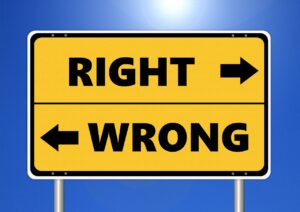Ethics in Public Speaking

Ethics is a branch of philosophical study that deals with issues of right and wrong, fairness, and justice. It is a code that individuals live by. Ethics can be thought of as a collective set of principles that are influenced by the culture of a region, a nation, or the global community.
Behaving ethically is not the same as following the law, since certain laws may not be ethical. Consider racist laws in the U.S. before the Civil War, or in apartheid South Africa, for examples of unethical (and immoral) laws.[1] Nor is ethical behavior just based in the expectations of society. There are times when society’s norms or expectations will contradict one’s own ethical standards.
Why would you need to even consider ethics in public speaking? First and foremost, your audience not only needs to believe in your words and message, but they need to trust you as the message giver. To engage in unethical behavior when speaking only erodes that trust.
There are other reasons to engage in ethical behavior in public speaking:
-
To maintain your credibility and reputation.
-
To present a fair and accurate argument of your thesis.
-
To provide honest facts with integrity and without deception or distortion.
-
To abide by shared or common moral values and beliefs.
The study of ethics is incredibly important to any student of public speaking, as the most effective public speakers are those who practice ethical behavior in their speeches.
In 1999, the National Communication Association (NCA) released a “credo,” or statement of beliefs, describing their standards for ethical communication. Below you will find the statement in its entirety. Below the statement, we will call attention to a few of the principles most relevant to students of public speaking.
National Communication Association Credo for Ethical Communication
(approved by the National Communication Association (NCA) Legislative Council, November 1999)
Questions of right and wrong arise whenever people communicate. Ethical communication is fundamental to responsible thinking, decision making, and the development of relationships and communities within and across contexts, cultures, channels, and media. Moreover, ethical communication enhances human worth and dignity by fostering truthfulness, fairness, responsibility, personal integrity, and respect for self and others. We believe that unethical communication threatens the quality of all communication and consequently the well-being of individuals and the society in which we live. Therefore we, the members of the National Communication Association, endorse and are committed to practicing the following principles of ethical communication:
- We advocate truthfulness, accuracy, honesty, and reason as essential to the integrity of communication.
- We endorse freedom of expression, diversity of perspective, and tolerance of dissent to achieve the informed and responsible decision making fundamental to a civil society.
- We strive to understand and respect other communicators before evaluating and responding to their messages.
- We promote access to communication resources and opportunities as necessary to fulfill human potential and contribute to the well-being of families, communities, and society.
- We promote communication climates of caring and mutual understanding that respect the unique needs and characteristics of individual communicators.
- We condemn communication that degrades individuals and humanity through distortion, intimidation, coercion, and violence, and through the expression of intolerance and hatred.
- We are committed to the courageous expression of personal convictions in pursuit of fairness and justice.
- We advocate sharing information, opinions, and feelings when facing significant choices while also respecting privacy and confidentiality.
- We accept responsibility for the short- and long-term consequences for our own communication and expect the same of others.
National Communication Association Advocacy & Public Engagement (opens in new window)
“We advocate truthfulness, accuracy, honesty, and reason as essential to the integrity of communication.”
“We accept responsibility for the short- and long-term consequences for our own communication and expect the same of others.”
-
Ethical speakers do not deceive their audience. It can also be stated that ethical speakers do not distort or warp facts, or worse yet, disguise opinions as fact in order to argue their thesis or make their point.
-
To speak ethically is to use your own original speech content. If you use any substantiating facts or passages from another source, you must give appropriate attribution or credit as necessary. Ethical speakers are ones who do not plagiarize their material or try to pass off words and ideas from others as their own. One of the main reasons we emphasize attribution of ideas is because of the question of responsibility and consequences, the final principle in the National Communication Association (NCA)’s Credo. When we speak, we assume responsibility for the ideas we are communicating. If someone else is responsible for these ideas, they need to be acknowledged and cited. We will discuss citation and attribution later in this module.
-
Acknowledging and responding to conflicts of interest is also regarded as ethical public speaking behavior. We will cover conflict of interest in more detail on the next page.
“We endorse freedom of expression, diversity of perspective, and tolerance of dissent to achieve the informed and responsible decision making fundamental to a civil society.”
- The First Amendment of the U.S. Constitution guarantees the freedom of speech and of the press, as well as the right of the people to assemble and to “petition the Government for a redress of grievances.” In other words, the right to free speech is bound up with the right to disagree peacefully—not just with each other, but with the government. We’ll dive deeper into the legal context of freedom of expression elsewhere in this module. For now, we’ll just note that the right to free speech and the right to dissent are important both legally and ethically. In fact, the right to “petition the Government for a redress of grievances” is what connects ethics and the law. When a law or legislation is considered unethical, the people can speak out to change it.
“We strive to understand and respect other communicators before evaluating and responding to their messages.”
- Here we are reminded that ethical communication is not just about what you say. Listening actively and responding appropriately are key elements in communicating ethically.
“We promote communication climates of caring and mutual understanding that respect the unique needs and characteristics of individual communicators.”
- One element of creating a climate of “caring and mutual understanding” is an effort to use language that is inclusive and considerate toward all listeners. We cover the principle of inclusive language on the next page.
“We condemn communication that degrades individuals and humanity through distortion, intimidation, coercion, and violence, and through the expression of intolerance and hatred.”
- Elements that work against inclusivity in language are hate speech and the language of intolerance.
“We are committed to the courageous expression of personal convictions in pursuit of fairness and justice.
- Ultimately, this standard is the highest goal of public speaking: speaking out effectively against unfairness, injustice, and intolerance, and working to create a more just society.
The Importance of Ethics in Public Speaking

Even though there is a credo for ethical communication, being ethical does not merely mean following a simple set of rules, which may change over time and depend on a variety of factors, so why is it important to carefully craft your speeches ethically?
History offers us many examples of great speakers who rose to power through their inspirational messages and energized the public towards civic engagement and positive change. However, there are also numerous examples of speakers who used the power of public speech for unethical, immoral, and unjust ends. The danger of unethical public speech is so pronounced that we have a specific word for leaders who use public speech for immoral and unethical purposes: demagogues. A demagogue is a leader who “gains popularity in a democracy by exploiting emotions, prejudice, and ignorance to arouse some against others, whipping up the passions of the crowd and shutting down reasoned deliberation” (Wikipedia: opens in new window). Infamous demagogues like Adolf Hitler, Benito Mussolini, Pol Pot, Joseph Stalin, and Joseph McCarthy stand as stark reminders of the catastrophic potential of unethical public speech.
Language is important. It can unite and divide, elevate and tear down. Using language, especially publicly, carries a tremendous responsibility. When committing your voice to the public sphere, you are faced with a series of ethical considerations—from the language you use and the ideas you amplify to the way you build your argument and credit others’ ideas. Ultimately, ethics in public speaking is about using the power of our language honestly, thoughtfully, and responsibly.
An ethical dilemma
Let’s say you were hired to gather and present data on the effectiveness of an after-school tutoring program. From what everyone says, the tutoring program seems to be doing great work and is very popular. The group organizing the program wants to have data to present to donors and foundations. After you gather and analyze your data, however, you find that the data doesn’t make a very convincing case for the program. The test numbers immediately after students finished tutoring look good, but six months out, students’ performance actually seems to go down. Also, the survey shows a small group of students who report a fairly negative experience with the program. It would be difficult to show the effectiveness of the program without “cherry picking” the data a bit—discarding some responses and ignoring the longer-term test data. It would really help this program if you could present a clear picture of strong positive results. Should you adjust the data a bit to showcase the success of the program?
Chances are, your response to this question was, “well, it depends.” The answers to ethical questions are rarely obvious, and often involve competing interests. When confronted with an ethical dilemma, you need to analyze the problem and decide which principles are at play. In this case study, we can see a potential conflict between a professional commitment (the desire to perform responsible statistical analysis) and a social commitment (the desire to see a good program succeed). The solution to an ethical dilemma might require choosing one side or another, but it might also require approaching the problem from a different direction altogether. In this case, there may be ways to communicate with the various stakeholders to support the program without manipulating the statistics unethically. Or perhaps it is possible to gather new data, or demonstrate the program’s value in a different way.
- Manuel Velasquez, Claire Andre, Thomas Shanks, S.J., and Michael J. Meyer. Issues in Ethics IIE V1 N1 (Fall 1987). Revised in 2010. What is Ethics? (opens in new window) ↵
